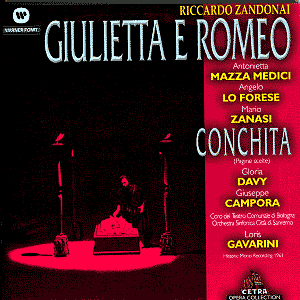I
was recently asked to speak at a meeting of opera lovers and was
told that the large membership knew the names of operas and their
composers from Monteverdi to the present day. That was a great
encouragement and so I went only to find that no one has heard
of Riccardo Zandonai! That was both shocking and unforgivable!
Zandonai
was born at Sacco di Trention on 28 May 1883. He studied at Rovereto
from 1893 to 1898 and then with Mascagnini in Pesaro. His operas
are:-
Il
grillo del Focalare 1908
Conchita
1911
Melenis
1912
Francesca
da Rimini 1914
La
via della finestra 1919
Guiletta
e Romeo 1922
I
Cavalieri di Ekebu 1925
Guiliano
1928
La
farsa amorosa 1933
He
wrote some orchestral serenades, the Symphonic Poem The Return
of Ulysses and a glowing Violin Concerto
He
died in Pesaro on 5 June 1944.
Francesca
da Rimini is a truly magnificent opera eclipsing most of the
Verdi and Puccini operas except perhaps the superb Simon Boccanegra.
Zandonai operas are devoid of the sentimentality of Verdi and
the pomposity as in the grand march from Aida although
I will be the first to admit that the closing scene of Aida
is very moving. Amneris's repeated D flats will always pack a
punch. I will never forget the first time I heard this with the
lovely Jean Allister as the jealous lover condemning Rhadames
to be buried alive with Aida.
Guilettea
e Romeo begins with a brief orchestral introduction which
is playful and subdued with a wonderful atmosphere of innocence
with appropriate hints of tragedy and tension. The singing between
Tebaldo and Uomini contains portents of excitement above a rich
but not exaggerated orchestration. The chorus of women is ethereal
and Maschere's voice is very telling. Gregario's low voice is
sinister and the accompanying choral writing is creepy. The introduction
of communal laughter in this opera and others never works as far
as I am concerned. The soprano and tenor duet Se l'amore non ritorna
and the repeated Il canto are most effective. Montecchino's rich
voice is a delight and Donna and Gragario throw fragments of melody
with expertly judged agitation. Excitement is never far away and
where Zandonai suceeds over Verdi and others it is that he can
make recitative and sung dialogue so fascinating. Tebaldi's solo
Che fu? is quite stunning and a brief passage for Il Mascherato
momentarily recalls Puccini's Tosca.
It
is with the introduction of Juliet and Romeo that we have extended
solos. Juliet is brilliantly portrayed in the orchestra as coquettish
and that is rightly so.
I
have always been troubled by sopranos who sing the role of Juliet
in various works. Often they have been very large women who have
no youthful looks or innocence of voice. But then what soprano
of fourteen years could rightly interpret the vocal parts written
for a Juliet? The singer here is no pubescent girl either. Romeo
has two splendid solos Deh! Bel fioretti! and a longer solo at
Ben Veerei. Juliet's first real solo Signor mie dolice is quite
lovely and lacks the sentimentality of both Verdi and Puccini.
Zandonia's music is more controlled and thus avoids the pitfalls
of empty emotion and slush
As
to Conchita and, as you might expect, it is a Spanish love story
similar in some ways to Bizet's Carmen.
The
booklet states that it is an opera in four acts and six scenes
yet the score does not mention scenes. The libretto is by Maurice
Vaucaire and Carlo Zangarini after the novel Le femme et le
pantin by Pierre Louys and was commissioned by the music publishers
Giulio and Tito Ricordi. Vittoria Cima was a wealthy woman of
Turin who urged the composer Arrigo Boito to recommend Zandonai.
There were some trials in transposing the novel into a libretto
and the establishments of rights. Puccini had apparently turned
down setting this as an opera as did Enrico Bossi. The final libretto
diluted the rawness of the novel which tells of a cigarette girl
from Seville who ensnares rich men, leads them on and gives out
erotic signals and when the men attempt to respond to her seduction
she refuses and snubs them having acquired their money first.
Nothing has changed!
Conchita
ensnares Mateo and but does not yield to him. She teases and torments
him without mercy and he finally snaps and beats her. She has
taken his money and promised to give him her charms and has kept
him dangling and finds that he is too gentle and loving
‘The
excerpts are
band
12 starting page 57 of full score
band
13 page 94
band
14 page 140 . This is the orchestral intermezzo nella strade
band
15 page 188
band
16 page 242
band
17 page 365
bands
18 and 19 are continuous starting from page 523 which contains
almost all the music from atto quarto but omits the Prelude which
is a lovely piece.
One
excerpt concludes with words not in the accompanying booklet which
adds to my view that this recording is the performance broadcast
by the BBC as a complete opera a generation ago.
The
booklet also refers to scene numbers which is daft because no
scenes are notated in the score.
The
opera was first performed in Milan on the 14 October 1911 and
is a work of great colour, rhythmic vitality, clear structure
and an amazing originality. It puts Carmen in the shade.
I
could write pages extolling the virtues of this music and disc
but I fear that would be repetitive.
A
lovely presentation.
David
Wright

![]() Chorus of Communal Theatre
of Bologna,
Chorus of Communal Theatre
of Bologna, ![]() WARNER FONIT 5050466-2963-2-0
[2CDs]
WARNER FONIT 5050466-2963-2-0
[2CDs]